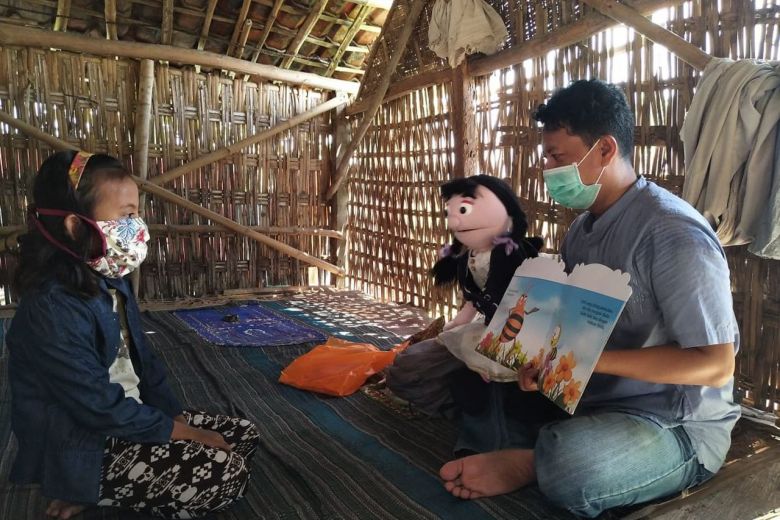Coronavirus: Students, teachers find ways to adapt to remote learning in far-flung areas of Indonesia

Elementary school teacher Avan Fathurrahman visits his student at home and use unconventional learning media, such as story books. PHOTO: COURTESY OF AVAN FATHURRAHMAN via The Straits Times
JAKARTA — No Wi-Fi for virtual classes and no smartphones or televisions to watch their teachers or educational programs broadcast by the government.
Millions of students, especially in the backwaters of Indonesia, such as Komodo island in East Nusa Tenggara, Rupat island in Riau province and Madura island in East Java, are struggling with home-based learning during the Covid-19 pandemic, as they lack basic technology such as Internet connection.
Some teachers have ended up visiting students in their homes for daily lessons.
Junior high school student Indriyani Safitri has been studying at home on Komodo island with up to seven of her friends since the end of March.
“I’ve borrowed my father’s handphone because my friends don’t have it. We use it together,” the 13-year-old told The Straits Times over the phone.
Article continues after this advertisementSometimes she must walk 100m to 200m out of her house to get an Internet signal. But what bothers her most is the absence of the teacher, who sets homework for her students on WhatsApp.
Article continues after this advertisement“Studying at school is better. We can directly ask questions to our teacher when we don’t understand,” said Indriyani.
Her father, Mr Ramang Fatahullah, 42, lamented the fact that he could not always help his daughter.
“It’s really hard to teach my daughter because her (study) materials are difficult,” he said.
The father of three also has another issue with the cost of the Internet, which has become less affordable for him these days.
“With the pandemic, all tourism jobs are lost,” said Mr Ramang, a tour guide on the island which is home to the well-known komodo dragons.
On Rupat island, nine-year-old elementary student Ragina has mostly used her relative’s smartphone to receive and send her school assignments. This is because the family’s Internet access is limited and the connection intermittent, said Madam Erna, 37, Regina’s mother.
Sometimes mother and daughter will ride on a motorbike to submit assignments to the teacher at her house.
Indonesian students complained about a lack of interaction with their teachers in virtual classrooms in a survey conducted by the Indonesian Child Protection Commission (KPAI) in April. A majority of the students also said they were tired because of the amount of homework assigned by the teachers with tight deadlines.
But, in Sumenep, Madura island, elementary school teacher Avan Fathurrahman, has taken an out-of-the-box approach. Every day, he visits some of his 19 students in their houses, bringing along with him encyclopaedias and children’s storybooks, some of which they can borrow.
He entertains students in the lower grades, conducting storytelling sessions with hand puppets.
“I want my students to experience fun learning,” he said. “With that, I hope to nurture their interest in reading, with which they can get much knowledge.”
The 40-year-old native to Sumenep has been zipping around on his motorbike, often passing muddy and slippery roads on rainy days, to reach his students since late March. Most of them have neither televisions to watch lessons on public TV broadcasts nor smartphones to do online learning.
Mr Avan believes online learning is good but said the policy needs to be adjusted given diverse realities in the vast archipelago where many students, like his own, are from low-income families and live in remote areas.
“The parents of one student even wanted to borrow some money to buy a new phone. And I explained to them that they didn’t need one. It’s okay if they don’t have it. Let me just go around,” the teacher said.
For more news about the novel coronavirus click here.
What you need to know about Coronavirus.
For more information on COVID-19, call the DOH Hotline: (02) 86517800 local 1149/1150.
The Inquirer Foundation supports our healthcare frontliners and is still accepting cash donations to be deposited at Banco de Oro (BDO) current account #007960018860 or donate through PayMaya using this link.